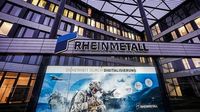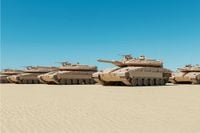Germany’s largest ammunition manufacturer, Rheinmetall, has reported a remarkable surge in sales and profits in the first quarter of 2025, driven primarily by increased domestic orders and a notable rise in defense spending across Europe. The company’s sales soared by 46% year-on-year, reaching €2.3 billion, with its defense business experiencing a staggering 73% increase, which has positioned Rheinmetall as a key player in the evolving geopolitical landscape.
Rheinmetall’s defense revenue alone jumped to €1.8 billion, underscoring the growing demand for advanced defense systems and weapons, particularly in light of the ongoing Ukraine conflict and the suspension of U.S. military aid. This trend has prompted significant investment in European defense capabilities, leading to a 181% increase in the company’s order nominations, which rose to €11 billion in the first quarter.
Armin Papperger, Chair of the Executive Board of Rheinmetall AG, emphasized the company's vital role in this shifting environment, stating, "Rheinmetall is needed – customers are buying entire factories from us today. Europe must prepare itself for a new era in which we must oppose the threat to our liberal values with all our strength." He further noted, “We must and will deliver. We are experiencing growth like never before in the Group and are getting closer to our goal of becoming a global defense champion.”
The operating result for Rheinmetall also reflected this growth, increasing by 49% to €199 million, with the operating profit margin climbing to 8.7%. The company’s earnings from defense activities nearly doubled, reaching €206 million, showcasing the effectiveness of its strategic focus on defense solutions.
In terms of specific segments, the Vehicle Systems division reported a striking 93% increase in sales to €952 million, fueled by the delivery of swap body trucks for the German Armed Forces. The Weapons and Ammunition division achieved record sales of €599 million, a 66% increase attributed to heightened ammunition deliveries to NATO countries and Ukraine. Additionally, the Electronic Solutions segment saw sales rise by 49% to €427 million, driven by contracts related to infantry equipment and air defense systems.
However, not all segments fared as well. Rheinmetall’s civilian segment, Power Systems, encountered challenges, reporting a decline in sales to €505 million. This decrease was largely due to ongoing economic weaknesses in the automotive sector, which have affected project execution timelines.
Looking ahead, Rheinmetall has confirmed its optimistic outlook for the fiscal year 2025, forecasting group sales growth of between 25% and 30%. The company anticipates further improvements in its operating result and margin, projecting an operating result margin of around 15.5% for the year. Papperger remarked, "We are also massively expanding our capacities with the construction of new plants and strategic acquisitions."
The company’s order backlog reached a record €63 billion at the end of the first quarter, reflecting a robust pipeline of contracts and framework agreements. This backlog is expected to secure continued sales growth in the coming years, especially as defense spending in Europe ramps up in response to rising security concerns.
Germany’s recent historic debt reform, which aims to increase defense and infrastructure spending, has played a crucial role in bolstering Rheinmetall’s performance. The reform reflects a broader recognition of the need for enhanced military capabilities in light of current global tensions.
Rheinmetall’s stock has responded positively to these developments, with shares rising by 1.5% at market open and extending their gains to an impressive 170% so far this year. This remarkable performance underscores the growing investor confidence in the company’s strategic direction and its ability to capitalize on the evolving defense market.
In summary, Rheinmetall’s first-quarter results highlight a significant shift in the defense landscape, driven by increased demand for military capabilities amid geopolitical uncertainties. As the company continues to expand its operations and adapt to changing market conditions, it remains committed to its goal of becoming a global leader in defense solutions.


